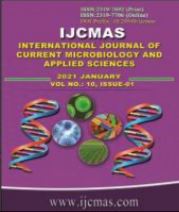


 National Academy of Agricultural Sciences (NAAS)
National Academy of Agricultural Sciences (NAAS)

|
PRINT ISSN : 2319-7692
Online ISSN : 2319-7706 Issues : 12 per year Publisher : Excellent Publishers Email : editorijcmas@gmail.com / submit@ijcmas.com Editor-in-chief: Dr.M.Prakash Index Copernicus ICV 2018: 95.39 NAAS RATING 2020: 5.38 |
In India, malnutrition and poor health is a common problem in rural areas which retards growth, increases the vulnerability and duration of illness, reduces work output and slows down social and mental development. Nutrition garden is a structured model with a multiple crops suited to all the seasons. The present study has been undertaken to assess the effect of nutrition garden in respect of nutrition and economy of the farm families of Golaghat and Sivasagar district of Assam. All total 20 households were selected through purposive sampling technique by screening households based on their willingness and interest to establish nutrition garden in an area of 200 m2. Unavailability of quality seed material and lack of technical knowledge is the major constraints while availability of water for irrigation ranked second and lack of technical knowledge ranked third constraint in establishing nutrition garden. Demonstration of nutrition garden resulted in increase in homestead vegetable production and consumption of excess vegetables. After intervention, production of vegetables at beneficiary’s level increased up to 151.97 per cent resulting in its increased consumption (41.12 %). Per capita availability of nutrients/day also increased significantly after intervention. Demonstration had positive effect on making availability of more nutrients (such as 2.37% protein, 34.29% iron, 19.57% calcium, 34.28% beta-carotene, 177.50% vitamin C and 16.53% folic acid of RDA) to individuals. Thus, establishment of nutrition gardens had immense role in tackling the problem of malnutrition and micronutrients deficiencies in rural areas.
 |
 |
 |
 |
 |